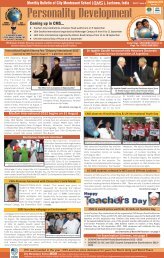Download the Speeches of all Hon'ble Chief Justices & Judges in ...
Download the Speeches of all Hon'ble Chief Justices & Judges in ...
Download the Speeches of all Hon'ble Chief Justices & Judges in ...
Create successful ePaper yourself
Turn your PDF publications into a flip-book with our unique Google optimized e-Paper software.
5 th International Conference <strong>of</strong> <strong>Chief</strong> <strong>Justices</strong> <strong>of</strong> <strong>the</strong> WorldAddress byHon’ble Mr Justice Peter S. Shivute<strong>Chief</strong> Justice <strong>of</strong> <strong>the</strong> Republic <strong>of</strong> NamibiaIn many legal orders, <strong>in</strong> <strong>the</strong> judgments <strong>of</strong> <strong>the</strong> Courts, and <strong>in</strong> <strong>the</strong> text <strong>of</strong> many modern dayconstitutions, <strong>in</strong>clud<strong>in</strong>g Namibia’s, one notices an encourag<strong>in</strong>g trend towards <strong>the</strong> embrac<strong>in</strong>g<strong>of</strong> <strong>in</strong>ternational law.Why this may be <strong>the</strong> case, that sovereign states (particularly modern states) have movedtowards an ‘<strong>in</strong>ternationalist trend’ <strong>in</strong> <strong>the</strong>ir constitutional expressions is perhaps expla<strong>in</strong>edby <strong>the</strong> <strong>in</strong>ternational human rights discourse and <strong>the</strong> concerted approach <strong>of</strong> <strong>the</strong> nations <strong>of</strong><strong>the</strong> world <strong>in</strong> resolv<strong>in</strong>g global problems and deal<strong>in</strong>g with matters <strong>of</strong> economic <strong>in</strong>tegration.International law has come a long way to where it f<strong>in</strong>ds itself today. The traditional sources,treaties, custom, and general pr<strong>in</strong>ciples <strong>of</strong> law, nowadays certa<strong>in</strong>ly require amplificationby resolutions, declarations <strong>of</strong> <strong>in</strong>ternational organizations and some persuasive codes <strong>of</strong> conduct and as such, one is to<strong>in</strong>terpret Article 38(1) <strong>of</strong> <strong>the</strong> Statute <strong>of</strong> <strong>the</strong> International Court <strong>of</strong> Justice to reflect <strong>the</strong> sources <strong>of</strong> <strong>in</strong>ternational law that wereavailable at <strong>the</strong> time. With a globalized perspective to <strong>in</strong>ternational matters, <strong>the</strong> <strong>the</strong>me for this conference is <strong>the</strong>refore apt <strong>in</strong>recogniz<strong>in</strong>g judicial activism and urg<strong>in</strong>g a move-away from <strong>the</strong> positivist hard law and normative s<strong>of</strong>t law paradigm <strong>of</strong> legalth<strong>in</strong>k<strong>in</strong>g which afflicts many a lawyer’s m<strong>in</strong>d, if we are to fully encapsulate today’s <strong>in</strong>ternational legal order.However, I must post a caveat and observe caution. Not <strong>all</strong> rules <strong>of</strong> practice or action at <strong>the</strong> <strong>in</strong>ternational level can rise to<strong>the</strong> level <strong>of</strong> <strong>the</strong>ir applicability to <strong>all</strong> and f<strong>in</strong>d enforceability by national courts. As has been <strong>the</strong> case <strong>in</strong> <strong>the</strong> past, my view isthat for <strong>in</strong>ternational law to be recognized <strong>in</strong> <strong>the</strong> first place, and enforceable <strong>the</strong>reafter, it needs to have very strongfoundations to be acceptable to <strong>all</strong>. It is possible, as has been <strong>the</strong> case before, that such may become acceptable to <strong>all</strong>, butwith variations for differences <strong>of</strong> application across <strong>the</strong> board.Yet thus far, <strong>the</strong> cryst<strong>all</strong>ization <strong>of</strong> certa<strong>in</strong> pr<strong>in</strong>ciples <strong>of</strong> <strong>in</strong>ternational law to universal acceptability and <strong>the</strong>reafter enforcementhas done well to our jurisprudences <strong>in</strong> act<strong>in</strong>g as fertile supplements to domestic law. This cross-poll<strong>in</strong>ation <strong>of</strong> legal dogmaoccurs quite vigorously notwithstand<strong>in</strong>g <strong>the</strong> criticism <strong>of</strong> <strong>the</strong> courts for <strong>the</strong> so c<strong>all</strong>ed ‘judicial timidity’. This criticism contendsthat courts <strong>in</strong>terpret <strong>the</strong>ir national constitutional provisions narrowly where <strong>the</strong>y import <strong>in</strong>ternational law <strong>in</strong>to <strong>the</strong> domesticlegal systems; fur<strong>the</strong>r that courts will <strong>in</strong>terpret <strong>in</strong>ternational rules <strong>in</strong> fashion that does not upset governmental <strong>in</strong>terests; andthat courts shield beh<strong>in</strong>d ‘avoidance’ doctr<strong>in</strong>es <strong>in</strong> avoid<strong>in</strong>g judicial review <strong>of</strong> government conduct and action.The tricky part arises where a given state refuses to sign, accede or ratify an <strong>in</strong>ternational treaty/convention, for <strong>in</strong>stance,<strong>the</strong> 1989 Convention on <strong>the</strong> Rights <strong>of</strong> <strong>the</strong> Child, which <strong>in</strong> my view is likely to, later on by widespread applicability, ascendto universal acceptability. Such a state may very well have consistently objected to <strong>the</strong> Convention’s provisions, yet it maybe argued, that dom<strong>in</strong>ant public op<strong>in</strong>ion, <strong>in</strong>ternal and external, may b<strong>in</strong>d <strong>the</strong> conscience <strong>of</strong> <strong>the</strong> state to feel obliged to upholdsuch an <strong>in</strong>strument.Hon’ble Mr Justice Peter S. Shivute,<strong>Chief</strong> Justice <strong>of</strong> <strong>the</strong> Republic <strong>of</strong>Namibia be<strong>in</strong>g garlanded<strong>Hon'ble</strong> Mr Justice P S Shivute, <strong>Chief</strong>Justice, Supreme Court <strong>of</strong> Nambiaaddress<strong>in</strong>g <strong>the</strong> ConferenceA great deal <strong>of</strong> <strong>in</strong>terpretation will be generated <strong>in</strong> determ<strong>in</strong><strong>in</strong>g applicability based on <strong>the</strong><strong>in</strong>corporation and transformation clauses <strong>in</strong> <strong>the</strong> national constitution, for as long as statesovereignty exists. Ultimately, I submit that <strong>the</strong> very key to acceptable and applicable<strong>in</strong>ternational norms, lies <strong>in</strong> <strong>the</strong> political will <strong>of</strong> <strong>the</strong> custodians <strong>of</strong> <strong>the</strong> electoral confidenceto determ<strong>in</strong>e <strong>the</strong> dest<strong>in</strong>y <strong>of</strong> <strong>the</strong> peoples <strong>of</strong> <strong>the</strong> world.This may be a weakness and a strength altoge<strong>the</strong>r, as political considerations aresusceptible to manipulation <strong>in</strong> <strong>the</strong> <strong>in</strong>terests <strong>of</strong> retention <strong>of</strong> political mandate or o<strong>the</strong>rwise,<strong>in</strong>clud<strong>in</strong>g fear <strong>of</strong> reprisal. A case <strong>in</strong> po<strong>in</strong>t is <strong>the</strong> debate surround<strong>in</strong>g <strong>the</strong> InternationalCrim<strong>in</strong>al Court <strong>in</strong> many <strong>of</strong> <strong>the</strong> world’s capitals. On <strong>the</strong> o<strong>the</strong>r hand, <strong>in</strong>-as-much as electoralsystems <strong>all</strong>ow for representation, <strong>the</strong> law makers may very well spurn sympathy towards--23--
















